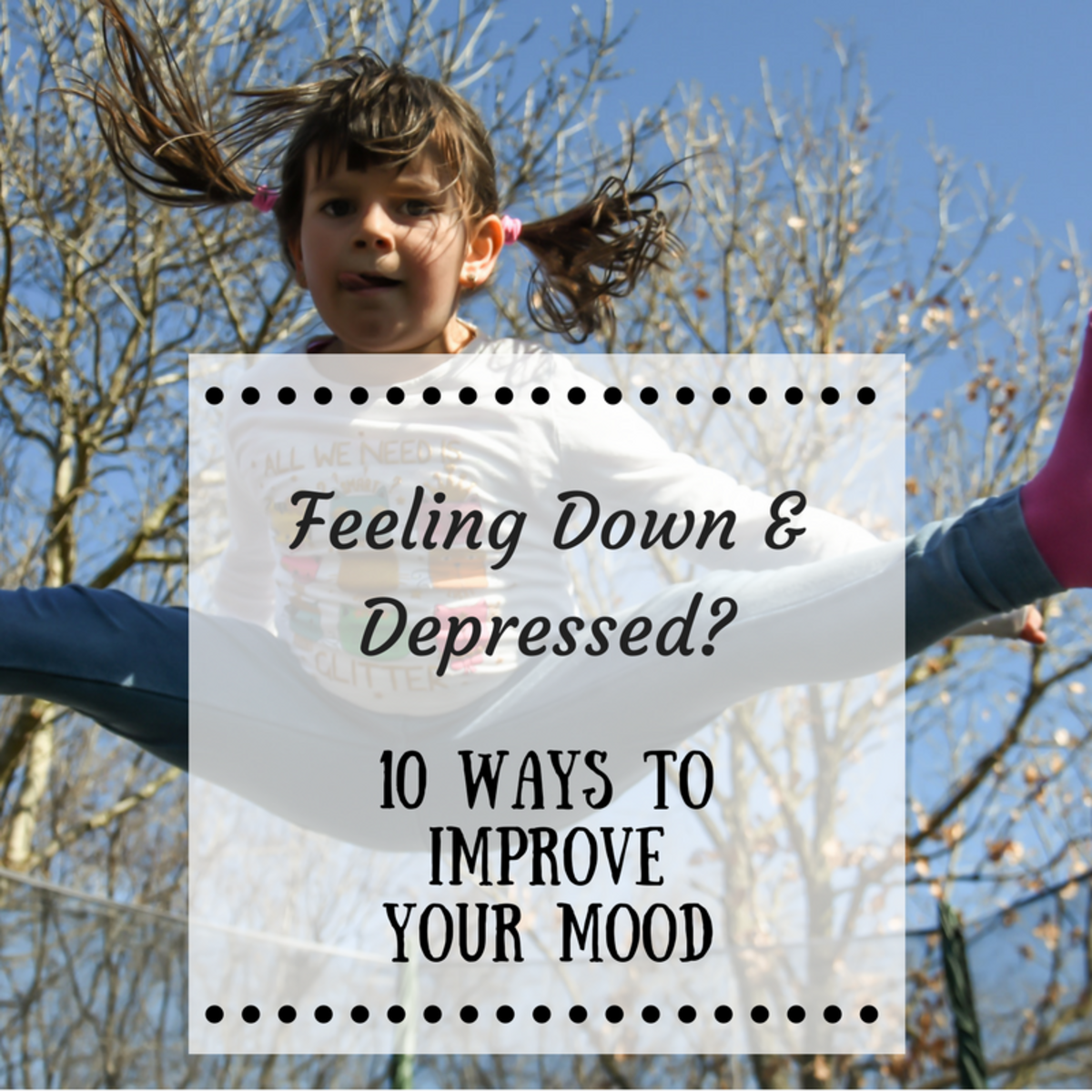Depression: 7 Best and Easiest Steps You Can Take To Help Yourself
Everyone experiences a slight depression from time to time for a variety of reasons. Maybe you just broke up with your significant other, got a divorce, a loved one has died, your pet has died, or you’ve lost your job and you’re having trouble finding another one. Mourning these losses is normal, expected, and in fact healthy, for a reasonable period of time.
There are many reasons why people go through a short, usually limited depression from time to time, and it is perfectly normal. It is only when the depression hangs on overly long or gets worse that it becomes a serious problem. In that case you should seek professional help.
It is important to try to keep your spirits up. Before depression becomes a serious issue, there are things you can do yourself that may improve your outlook and help you keep a positive attitude while you work through whatever problem may have set it off.


Even Minor Depression Affects Your Whole Life and Your Body
Depression affects your whole life and can have a profoundly negative affect on various aspects of your life. It can sabotage your job prospects, destroy a relationship, and sadly, even lead to suicide. Yes, and it can even cause negative physical affects on your body.
Do not let depression make itself at home in your mind. It is fine to mourn an important loss like the death of a loved one, or the breakup of an important relationship, or the loss of a job, or some other major catastrophe for a certain period of time, but after what is a reasonable time of mourning for whatever has happened in your life, you need to be learning how to cope with what has become, like it or not, a new normal in your life.
The “reasonable mourning time” will vary according to exactly what event has triggered the depression, and the personality of the individual experiencing the loss or change.
We do not all cope with disaster in the same way, and allowance must be made for that fact. Further, it is expected that it will take longer to learn to cope with the major events mentioned; loss of a loved one, loss of a job, etc., than it will to move on from the damage or destruction of a family heirloom, or a relatively minor car accident, for example.
When it feels to you like your depression is taking too long to lift, if you are having suicidal thoughts, or if friends and family who care about you are very concerned that your depression is becoming a major issue, it is time to consult a professional. Do not let depression get such a hold on you that you allow it to sabotage your job search efforts, so that you affect your children’s lives adversely on a daily basis, or that you actually make an attempt on your own life. These are just a few of the negative affects depression can have on an individual. Seek help from a professional in these situations, and do it quickly.
Steps You Can Take That May Help Lift Your Depression or Prevent It From Getting Worse.
For less serious depression, or depression that is just getting underway, there are a few steps you can take to help yourself. By making an early intervention on your own behalf, you may be able to help yourself work through whatever event has triggered your depression, and possibly prevent your depression from worsening.
Music
Yes, play uplifting music throughout the day. I often recommend Sousa marches, but one of my favorite songs is Old Fashioned Rock and Roll by Bob Seger. There are lots of songs that make you want to get up and move. Play some of them at various intervals all through your day. Have them on your cell phone or CD player so that when your spirits dip low for too long, or you’re feeling sad, you can push a button and hear some rousing music that will immediately lift your spirits.
If your sadness is due to the loss of a loved one, clearly you will not feel like dancing right after you have come home from the wake or funeral, but after two or three weeks, you may want to start lifting your spirits. My guess is that your loved one would not want you to wallow in emotional pain for the rest of your life and would expect and want you to move on.
That does not mean you forget about your lost loved one, but rather that you gradually take steps to learn to live life without them. No matter how sad you are or how long you mourn, you cannot reverse their passing, so keep them in your heart. When you think of them, remember the best of times and be happy for the time you had then in your life.
Exercise
Exercise has been proven in many studies to improve one’s outlook. Regular, daily exercise for 20 to 30 minutes everyday can make a world of difference in how you feel about life. Play some rousing music while you do your workout. Exercise that gets you up and moving not only burns more calories, but also makes you feel better.
Get Outdoors Into Some Bright Sunshine
If possible, get outside and enjoy some bright sunshine. If necessary, make it possible! It has been determined through many studies that people generally feel at their lowest point during the hours of darkness, and during dull, dreary weather. If a person can be persuaded to postpone their suicide intentions until the sun comes up (or out again), most of the time they will not follow through with their suicide.
There is something about sunshine and being out where you can see beyond the limits of a dark room that brightens a person’s outlook and creates hope. Go outside for a few minutes, take a walk around the block, have a conversation over the garden fence with a neighbor, go to the park and watch the children playing, and get yourself a bushel basket of hope. Do it everyday.
Help Someone Worse Off Than Yourself, or Just Help Someone In Need.
Everyone needs some help once in a while no matter who they are or how perfect their life may seem.
Knowing that there are other people worse off than oneself does not always do the trick by itself, but getting to know those people and lending a hand can make the difference. Making a positive contribution to someone else’s life, helping in a way that you know has made a difference for them, even a small, but positive difference, can lift one’s spirits immeasurably.
Help someone carry their groceries up the stairs, give someone a lift to the doctor, volunteer at a not for profit organization. Do these things regularly everyday so that you make a positive contribution to your community and people in need living there. Knowing someone is better off for your help and that your efforts are appreciated and needed, and that if you were not there you would be missed, always feels good, so give yourself a chance to feel good everyday.
Make A List of Thing You Enjoy Doing
List your favorite things to do, especially if you have stopped doing them because you just do not feel like it. Force yourself if need be, to do one or more of the things on your list everyday. Be good to yourself. Always be your own best friend.
Develop or Maintain A Regular Routine
Keep a regular schedule and force yourself to keep if necessary. Having structure in your life, not to the point of being regimented, but having regular activities, a regular time to start your day, and a regular time to go to bed, will help your outlook. Take a walk around the block or to the park everyday around the same time. Visit a shut-in friend around the same time everyday.
Set Goals For Yourself
Is there something you’ve always wanted to do but never had the time? Learn how to do it and schedule time to work on it everyday. Set reasonable goals for accomplishing your new skill.
Spend at least an hour everyday if you are unemployed, searching for work or networking with other people in the same situation. Take at least an hour everyday to build up your endurance exercising so that you can loose weight and improve your health. Spend at least an hour everyday learning about and practicing a new skill. Take lessons if necessary.
Do Not Go Into a Denial State of Mind
If you are experiencing severe depression, or if you have been experiencing depression for a long time, do not pretend you are not or ignore your symptoms. Do not lie to yourself about what you are feeling. You cannot solve a problem until you recognize there is a problem.
For some reason people have no problem understanding when their other organs are malfunctioning, but when their brain is having trouble coping they imagine it is related to strength of character.
Like all the other organs in the body, the brain has certain requirements in order to function as it should. There are a lot of reasons why a person’s brain may not be healthy. Brain chemicals and hormones can make a huge difference in how clearly one thinks or how one feels and behaves.
Physical illness or accident can cause brain issues. Major emotional events can trigger serious brain malfunction and that is because what a person thinks and experiences affects the chemical balance in a person’s brain. There are many variables that can cause the brain to fall into a depression.
If the steps outlined above do not help and your depression has gone on for more than a month, consult a professional psychologist or psychiatrist for help. Do not take the chance that your condition may end in tragedy, and do not spend your life feeling bad. Get the help you need so that you can enjoy your life to its fullest.
Symptoms of Depression
Here is a list of symptoms of depression from the Mayo Clinic.
Feelings of sadness or unhappiness
Irritability or frustration, even over small matters
Loss of interest or pleasure in normal activities
Reduced sex drive
Insomnia or excessive sleeping
Changes in appetite — depression often causes decreased appetite and weight loss, but in some people it causes increased cravings for food, and weight gain
Agitation or restlessness — for example, pacing, hand-wringing, or an inability to sit still
Irritability or angry outbursts
Slowed thinking, speaking or body movements
Indecisiveness, distractibility and decreased concentration
Fatigue, tiredness and loss of energy — even small tasks may seem to require a lot of effort
Feelings of worthlessness or guilt, fixating on past failures or blaming yourself when things aren't going right
Trouble thinking, concentrating, making decisions and remembering things
Frequent thoughts of death, dying or suicide
Crying spells for no apparent reason
Unexplained physical problems, such as back pain or headaches
For some people, depression symptoms are so severe that it's obvious something isn't right. Other people feel generally miserable or unhappy without really knowing why.
Depression affects each person in different ways, so symptoms caused by depression vary from person to person. Inherited traits, age, gender and cultural background all play a role in how depression may affect you.
More info: http://www.mayoclinic.com/health/depression/ds00175/dsection=symptoms
More On Psychology from C. E. Clark
- Does Eye Color Indicate Intelligence and Personality? What Are Your Eyes Telling the World?
Researchers are embarking on studies that show a correlation between the color and pattern of the human eye iris and personality and intelligence. What do your eyes tell the world? - Are Cat Lovers Smarter Than Dog Lovers? + Personality Characteristics of Dog and Cat Lovers
In a recent study confessed cat lovers scored higher overall on intelligence tests than confessed dog lovers. Plus, lists of characteristics common to dog and cat lovers. - Does Your Height Affect Your Success? Is Taller Really Smarter?
Height makes a difference in employment and romantic success for both men and women. Some possible reasons why this is true. - Conformity: How Important Is It to YOU to Fit In?
Solomon Asch Experiments on conformity. How important is it to you, or to people generally to fit in? Why do many people choose to fit in? - Circumstances More Than Character or Personality Determine Human Behavior
Circumstances more than character or personality influence and determine human behavior. An explanation of why people sometimes do things that are out of character. - Do Your Food Cravings and Favorite Flavors Indicate Your Personality? Plus an Introduction to the Se
Find out what your flavor personality is and learn how to use that information to lose weight! Famous doctor of neurology and psychiatry with 25 years experience says it can be done.








